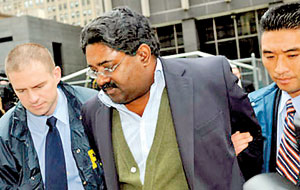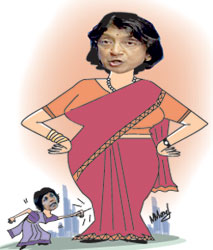Nearly a quarter of a century is a long time in the life of anyone, leave alone a new diplomat.
Sri Lanka's Permanent Representative at the United Nations in Geneva, Tamara Kunanayakam, flayed the UN Human Rights High Commissioner Navaneethan Pillay in her speech at the Human Rights Council. "It appears that the High Commissioner does not have the will to even acknowledge a paradigm shift in the policy of the Government of Sri Lanka," she complained. Then she castigated the west saying "might is not right."
In 1987, Ms, Kunanayakam represented the World Student Christian Federation. On February 23 of that year, there was an intervention by her at the UNHRC sessions. Here are edited excerpts from the official record of what she said then:
I speak on behalf of the World Student Christian Federation, a non-governmental organisation with movements in more than 90 countries throughout the world……………
The report of the Special Rapporteur on Torture (E/CN.4/]987/13, para.5) states that 'torture almost invariably takes place in a political context, " and that "victims of torture are very often opponents of the government in power.These reports show that the inter-related violations such as torture, disappearances and summary executions are manifestations of deeper structural realities.
Mr. Chairman, it is within this wider context identified by the Special Rapporteurs that we wish to deal with violations of human rights that occur in Sri Lanka. Our case is that the government of Sri Lanka should address itself to the underlying causes if it is genuine and very committed to the restoration of human rights in that country.
The distinguished delegate of Norway yesterday (24/2/8 7) said "Enforced and involuntary disappearances and torture of persons seem to be used as convenient tactics for governments suppressing opponents and espousing a policy of stifling dissent often on the grounds of national security or with reference to the national integrity and sovereignty.
This is exactly the practice prevailing in Sri Lanka today, in the context of the government's failure to address itself to the legitimate grievances of the Tamil people stemming from socio-economic and political causes. There is incontrovertible evidence that compared to previous years, larger numbers of people have been arrested in 1986, very often on a mass scale, and detained for prolonged periods. A civil rights monitoring group in Sri Lanka estimates that the total number taken into custody during 1986 to be in the region of 14,000 persons.
Those arrested are detained not in normal detention centres but in Army camps located in various parts of the country under degrading conditions.
Most of the arrests, the victims of which, by and large, are Tamils, are effected under the Prevention of Terrorism Act and Emergency Regulations. It may be noted that the Prevention of Terrorism Act has been described by the International Commission of Jurists as an ugly blot on the statute book of any civilised country. Sri Lanka has been ruled by the present government under a state of emergency for most of its life since 1977.
The Prevention of Terrorism Act authorises detention up to a period of 18 months and Emergency Regulations for an unlimited period. Yesterday (24/2/87) the Sri Lankan delegate sought to argue that unlimited detention is not possible under Emergency Regulations because orders under a State of Emergency can legally last only for a month.The fact of the matter is that the State of Emergency has been renewed every month without interruption during the last several years thus enabling detention of persons for unlimited periods. The Committee for Monitoring Cessation of Hostilities appointed by the government itself in its report dated 17 January, 1986 stated that "Those held under the Prevention of Terrorism Act for more than 18 months are served with detention orders under Emergency Regulations which authorise unlimited detention."
For all practical purposes there is no prospect of judicial review of detention of persons whether under the Prevention of Terrorism Act or Emergency Regulations. Mr. Chairman, yesterday (24/2/87) the Sri Lankan delegate sought to impress this Commission about the remedy available by way of habeas corpus applications. This remedy in actual practice has proved ineffective and in most cases unavailable. In this connection the President of the Law Society of Sri Lanka has said, "Since it is a tedious legal process which entails inordinate delays, a habeas corpus application does not serve the intended purpose. Quite a large number of applications in respect of persons about whom nothing is known after arrest, is still pending in the Appeal Court." (Island, 20 January, 1986).
The Sri Lankan delegate also claimed yesterday, that detainees or their relatives have the right to make representations to an Advisory Board appointed by the President. A delegation of the UK Parliamentary Human Rights Group which visited Sri Lanka in February 1985 stated, "The problem is that it frequently takes several months to file parent's or mother's letter requesting a review to reach the Advisory Board via the Ministry of Defence. And, once the Board has made its recommendation, it takes several more months before the Ministry of Defence acts upon it."
The Prevention of Terrorism Act and Emergency Regulations have removed most of the legal safeguards prescribed under the International Covenants on Human Rights. Prolonged incommunicado detention without trial is the norm. The whereabouts of people arrested and detained are not made known to relatives. Lawyers and relatives have no access to detainees in most cases.
Mr Chairman, it is in this context that many substantiated cases of torture and deaths in custody have been reported, so much so that the Special Rapporteur on Torture has expressed great concern in his report referring to Sri Lanka. The suspension of important legal safeguards under the Prevention of Terrorism Act and Emergency Regulations has created conditions conducive to the practice of torture.
Another new but reprehensible development reported during1986 has been the use of detainees as hostages and/or human shields during military operations by security forces.There is also substantial evidence to indicate that over a thousand persons have disappeared or gone missing after being taken into custody. Besides the well documented Amnesty International Report on Disappearances, dated September 1986, the UN Working Group also has reported an increasing number of disappearances. Highlights:
* private homes and offices are used as places of detention and interrogation
* families are never informed as to the cause of arrest; deliberate deception is also resorted to, to prevent families pursuing inquiries."
The same organisation also expressed its concern that "powers of arbitrary arrest and detention arrogated by the State are being increasingly used to silence its political opponents and to stifle popular protest against the regime.
Mr. Chairman, it should thus be recognised that these violations in the South are also occurring in a broader socio-political context, denial of basic trade union and democratic rights. Pickets, demonstrations and strikes have often been banned under Emergency Regulations, and when they had taken place those workers who participated have been summarily dismissed from employment.
For instance, when the Bank Employees decided to take industrial action in the form of a 'work to rule' campaign, Emergency Regulations were promulgated declaring banking and associated activities Essential Services, all industrial action made illegal, the entire leadership of the Bank Employees Union summarily dismissed and the Union's assets made liable to confiscation. In addition, the civic rights of the leaders of the Bank Union were made liable to be deprived.
Rajaratnam faces long term in jail
Raj Rajaratnam, whose overt and covert links to the LTTE were exposed in an investigative piece in Vanity Fair magazine, is expected to be sentenced next week following his conviction for insider training. A founder and head honcho of Galleon Group hedge fund in New York, Rajaratnam is accused of gaining more than $64 million from illegal stock trading.
 |
| Rajaratnam being taken to courts by police officers |
The New York Times said Federal prosecutors are seeking a prison term of more than 24 years which would be "the longest insider trading sentence in history".
The sentencing, originally scheduled for September 27, was postponed for October 13. A jury found Rajaratnam guilty last May in a case which has riveted Wall Street. Last week his lawyers met with the judge to plead for leniency on the grounds that the insider trading losses victimised no one.
At the pinnacle of his career, Rajaratnam was a much-sought-after figure in business circles here. And during her address to the Asia Society in New York a few years ago, former President Chandrika Kumaratunga singled out Rajaratnam by name and personally thanked him for his contribution to the government's tsunami fund. Rajaratnam, who was in the audience, took a metaphorical bow.
And when former Prime Minister Ranil Wickremesinghe hosted a dinner for potential investors at the Waldorf Astoria Hotel, Rajaratnam was one of the honoured guests. And he also had pride of place at his alumni old Thomian Dance in New York. But since then, how the mighty have fallen.
Resolution against
Pillay watered down
There is no love lost between Sri Lanka and the UN Human Rights High Commissioner Navaneethan Pillay who has taken a strong stand on war crimes charges against Sri Lanka.
As a result, Sri Lanka was one of 12 countries -- along with Cuba, Venezuela, Belarus, Bolivia, Algeria, Bangladesh, Indonesia, Malaysia, Pakistan, Palestine and Saudi Arabia -- that co-sponsored a resolution in Geneva last week critical of Pillay's office because its high-level staffing was apparently lopsided in favour of Western nations and lacked "a balance in geographical representation."
Sri Lanka's Permanent Representative to the UN at Geneva Tamara Kunanayakam, in a hard hitting speech, called for accountability from Pillay.
But less than 48 hours later, the resolution was taken out of circulation and substituted by a watered down presidential statement from the head of the Human Rights Council. Score one for Pillay and nil for Kunanayakam.
Therefore, who says all of Sri Lanka's diplomacy and charm offensives worked in Geneva at the 18th sessions of the UNHRC?
Mathai goes beyond protocol status
The familiarisation visit to Sri Lanka by India's new External Affairs Ministry Secretary Ranjan Mathai has been the talking point among EAM top brass in Colombo.
They were talking about protocol and asking why it was being breached to set up meetings for the Indian bureaucrat with President Mahinda Rajapaksa. One may argue, as most in the EAM do, that Sri Lanka is a close ally of India and hence the preferential status.
However, those not in favour point out that the same courtesy is not extended by New Delhi to Sri Lanka officials, particularly those at the High Commission. They are restricted to the officialdom. It does not extend to the External Affairs Minister (unless under exceptional circumstances), said one of those who raises the issue.
He points out that even Robert Blake was granted an audience by President Rajapaksa though he enjoyed only Assistant Secretary status in the Department of State.
Blows to GTF plans
The London-based Global Tamil Forum planned its own event, a conference in Perth, Australia, ahead of the Commonwealth Heads of Government meeting later this month.
The organisers have been forced to cancel the event after most of the attendees said they could not make a lengthy journey to take part.
The GTF has now rescheduled the event to be held in Sydney. More shocks came then. Australian government officials have said they will not take part in any of their events.
|




